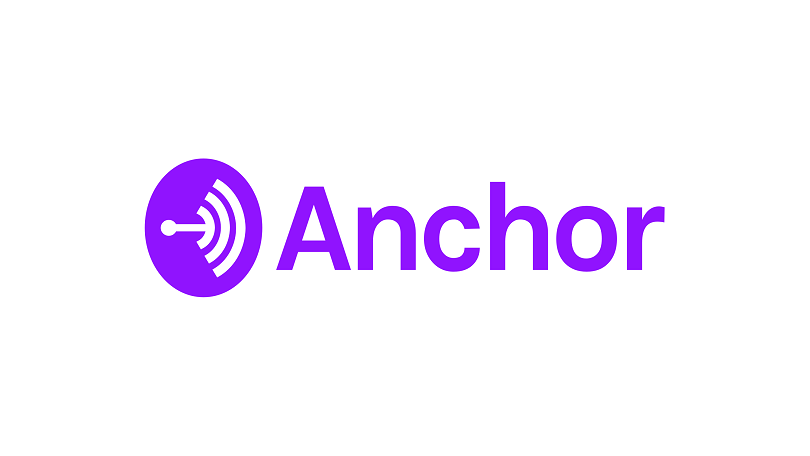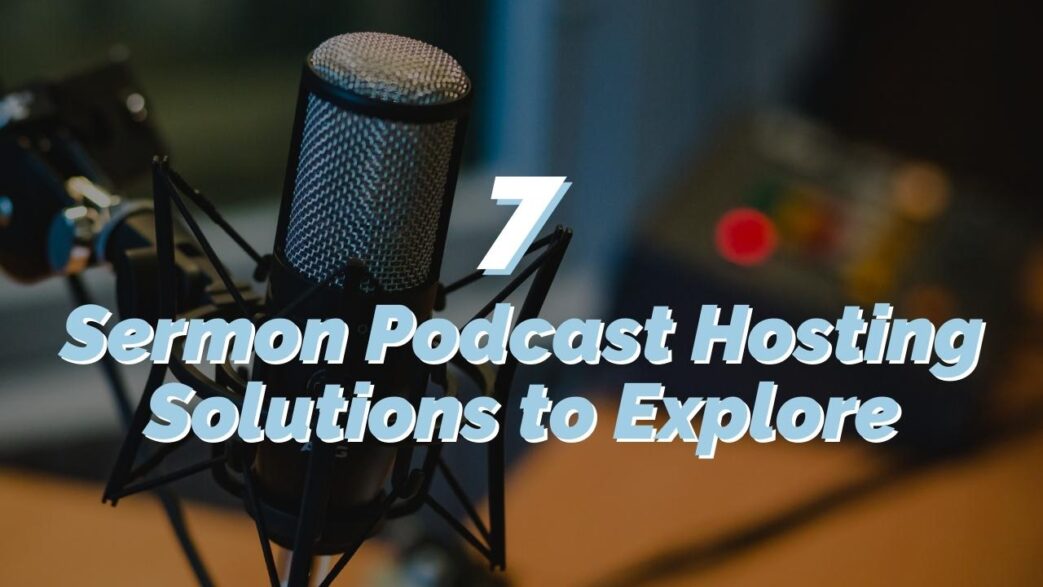If you’re looking for a great sermon podcast hosting service, look no further! Distributing your sermon via audio is the perfect way to extend the reach of your message beyond the weekend.
Podcasts are continuing to grow in popularity. According to Convince & Convert, the number of podcast listeners has grown 29.5% in three years, and 41% of Americans listen to podcasts monthly.
We’ve compiled a list of the top seven podcast hosting services for churches that are sure to meet your needs. So whether you’re just starting out or you’ve been podcasting for years, we have something for everyone.
Estimated reading time: 1 minute
Table of contents
Sermon Podcast Hosting

Before we get into our top 7 podcast hosting solutions, let’s explore a little more about what exactly sermon podcast hosting is and why we think you should get started doing it.
What is Sermon Podcast Hosting?
In simple terms, podcast hosting is a service that stores your audio files and makes them available for download or streaming.
Just like you need a web host to store the files for your website, you need a podcast host to store the files for your podcast. Without podcast hosting, you would have to find another way to store and deliver your audio files, which would be both expensive and complicated.
In addition, podcast hosting provides a number of other important features, such as
- Analytics so you can see how many people are listening to your podcast
- RSS feed generation, which is necessary in order for people to subscribe to your podcast
- The ability to submit your podcast to directories like iTunes and Stitcher
Podcast hosting is an essential part of starting and maintaining a successful podcast that makes the technical side of things much easier, and also gives you the ability to reach a wider audience and grow your ministry.
Should My Church Start a Sermon Podcast?
So that’s what podcast hosting is. But should your church start a sermon podcast? Well we think starting a sermon podcast can be a great idea for your church. It allows you to share the message of the Lord with a wider audience. In today’s digital age, many people turn to podcasts for inspiration and guidance. By creating a sermon podcast, your story can reach those who may not be able to attend church in person.
A podcast helps share stories of faith and hope, guiding listeners from darkness to light. Through your podcast, you can provide spiritual support and encouragement during tough times. It’s a way to spread the word of the Lord beyond the walls of your church.
Podcasts are also convenient. People can listen to your sermons anytime, whether they’re at home, in the car, or even at work. This flexibility can help keep your congregation connected throughout the week.
Additionally, a sermon podcast can preserve the history of your church’s teachings. Future generations can listen to these recordings and learn about your church’s journey and stories.
7 Best Sermon Podcast Hosting Companies

Now that we’ve explained what podcast hosting is and why you need it, let’s take a look at our top seven picks for sermon podcast hosting. We’ll also cover key features and pricing for each option.
1. Podbean
Podbean is one of the most popular podcast hosting platforms and for good reason. Their plans are very affordable and they offer the option to monetize.
Podbean has been around since 2006 and hosts over 620,000 podcasts. They work with businesses, education, entrepreneurs, nonprofits, and churches.
They also offer a number of features that are perfect for churches, such as the ability to password protect individual episodes, integration with church websites, and support for live streaming.
Key Features
- Unlimited storage and bandwidth
- Mobile podcasting from the app
- Crowdfunding with monthly donations
- Video podcasts available with Unlimited and Business plans
- Personal podcast site
Pricing
A free basic plan allows for 5 hours of total storage space and 100GB of monthly bandwidth. The unlimited plan starts at $9/month or you can upgrade to an Unlimited Plus or Business account for more features.
2. Buzzsprout
Buzzsprout is one of the easier, more intuitive podcast hosting platforms to use. Their drag-and-drop interface makes it simple to upload and edit your audio files.
One of the common themes in Buzzsprout reviews is exceptional customer service. They’re known for quick and thorough responses to customer inquiries.
Buzzsprout also has tools and resources to help you work through all the logistics of podcasting, from creating cover art to what technical equipment you need to how to edit your podcast.
Key Features
- Advanced podcast statistics
- Unlimited storage and team members with paid plans
- Excellent customer support
- Learning materials
- Magic Mastering to optimize audio (at additional cost)
- Lists your podcast in Apple Podcasts, Spotify, Google Podcasts, Stitcher, iHeartRadio, TuneIn, Alexa, Overcast, PocketCasts, Castro, Castbox, and Podchaser
Pricing
Buzzsprout allows you to start a podcast free for 90 days. The free plan allows you to upload two hours each month with episodes hosted for 90 days. Plans range from $12 per month to $24 per month depending on hours of hosting.
Add-ons include Magic Mastering and episode transcription at $0.25 per minute.
3. Subsplash
Subsplash is known for its work in the mobile app space. They have built apps for some of the largest churches and ministries in the world.
Subsplash is a top choice for churches and ministriies when it comes to apps. However, Subsplash also provides resources for podcasting. You can create a podcast feed directly from a media series. Or, you can upload episodes and have them published on Apple Podcasts, Spotify, Sticher, and other platforms.
Key Features
- Unlimited audio and video hosting
- Live streaming and live stream trimming
- Advanced podcast statistics
- Integrated media library
- One-click publishing
Pricing
If you’re already using Subsplash, you can find amazing integrations and packages that include various products you already use (or want to start using). The downside is that the price point may be higher than you like. Or if you’re just looking for a standalone podcast hosting company, Subsplash may be more than you want.
You’ll need to contact Subsplash directly to learn more about their pricing structure.
4. Anchor

Anchor is one of the newer podcast hosting platforms. It’s a great, simple option if you’re just getting started with podcasting. In addition, Anchor is affiliated with Spotify, so there are some perks like music integration and analytics.
Anchor is free to use and has some unique features, such as the ability to record directly from your phone. With easy editing, you can also add co-hosts, interviews, sound effects, and music to your episodes.
Key Features
- Free to use
- Unlimited storage and team members
- Interview guests directly from the app
- Intuitive building block editing
- Detailed metrics from Spotify
- Exclusive Spotify music integration
- Distribution to all major podcast apps
- Simple monetization options via paid subscriptions, ads, and listener support
Pricing
Anchor is free to use. There are no paid plans or add-ons at this time.
5. Simplecast
Simplecast is a top podcast hosting platform for professionals. Their interface is sleek and user-friendly and allos you to upload, edit, and publish your episodes with ease.
Key features include customizable RSS feeds, detailed episode analytics, and team collaboration tools. The downside of Simplecast is that it’s one of the more expensive podcast hosting platforms.
Key Features
- Unlimited storage and uploads
- Customizable show website with custom domain
- Embeddable episode player
- Recast
- Detailed episode analytics
Pricing
There are three tiers for Independent Podcaster pricing ranging from $15-85 per month. Simplecast also offers Professional and Enterprise plans for businesses.
6. Sermon Cloud
Sermon Cloud is a new podcast hosting platform that was created with churches and ministries in mind. Their mission is to help churches of all sizes reach people with their message.
When people visit the SermonCloud website, they have access to a wideranging library of sermons. They can easily search sermons by topic, title, speaker, or church.
Key Features
- Sermons findable via Sermon Cloud search page
- Integrations with Vimeo and YouTube for video
- Simplicity, built with churches in mind
- Customizable look, feel, and delivery
- Media management system to create RSS feeds and social media links
- Interactive sermon notes
Pricing
Sermon Cloud currently offers two plans. The Cumulus plan is currentlys $19 per month and includes 250 sermons. The Cirrus plan is currenlty $39 per month and includes unlimited sermon uploads.
7. Transistor
Transistor officially launched in 2018, so they’re a newer company when it comes to podcast hosting. But, they have a sleek interface and some great features for podcasters.
Transistor offers unlimited audio and video hosting. You can also live stream your episodes and trim them later.
Key Features
- Unlimited podcasts
- Private podcast episodes
- Advanced analytics
- 1-click distribution to Spotify, Apple Podcasts, Google Podcasts, Podcast Addict, Breaker, and Player FM and search engines
- Built-in website
Pricing
Transistor offers a free 14-day trial. The Starter plan starts at $19 a month. The Professional Plan is $49 a month and allows you to add team members, private podcast subscribers, and monthly downloads. They also offer a Business plan at $99 a month.
What Should You Do Before Investing In Sermon Podcast Hosting?

Before signing up for sermon podcast hosting and paying a monthly fee, make sure you’re prepared to launch your podcast.
Here are a few things to consider and plan as you prepare to launch a podcast.
The Format of Your Podcast
Will you simply capture and upload your weekend sermon, or will you provide additional elements like an intro or outro from your pastor or another team member?
Will your podcast include shows other than weekend service? For example, will you sometime feature interviews?
It’s important to know this upfront because it will affect how you name and market your podcast.
Your Target Audience
Who is your target audience? Are you trying to reach members of your church who live out of town or are homebound?
Do you want to share the gospel with people who don’t go to church?
Your target audience will also affect how you name and market your podcast.
The Name of Your Podcast
Your podcast name should be reflective of your target audience and the type of content they can expect. For example, if you’re targeting non-churchgoers, you may want to avoid churchy language in your title.
You also want to make sure your podcast name is easy to spell and pronounce. If people can’t find your podcast because they can’t spell the name, you’re losing out on potential listeners.
Your podcast name should be creative but clear and accurately represent your content.
Your Technical Podcasting Equipment
When it comes to podcasts, audio quality is everything! If you’re capturing audio from your live weekend service, make sure you have a good quality sound system. Then, work with your production crew to test and tweak your recordings until they come out right.
You’ll also need a microphone and recording software. If you’re planning on interviewing guests, you may need additional equipment like mixers and pop filters.
Investing in quality equipment upfront will save you time and money in the long run.
Your Podcast Creative Elements
Your podcast artwork should be high quality and on-brand. If you don’t have a designer on staff, there are plenty of great options for pre-made podcast artwork templates.
You’ll also need to come up with intros and outros for your show. Again, these can be as simple or complex as you want, but they should be consistent with the overall tone of your podcast. Also, make sure you’re using the right music
Planning and preparing for your podcast before your launch will save you a lot of time and headaches down the road. By taking the time to consider these elements, you’ll be able to hit the ground running when you finally launch your sermon podcast!
Why Is It Important to Have a Sermon Podcast?
There are many reasons why it is important for churches to have a sermon podcast. For one, it allows church members who are unable to attend services in person to still have access to valuable spiritual guidance and wisdom.
It also provides a way for those with busy schedules or people who live far away from their home congregations to tune into services regardless of where they are or what they are doing. People love to listen to podcasts while they’re exercising, driving, or doing chores around the house.
Additionally, having a sermon podcast makes it easier than ever before for people of all faiths and denominations to connect with others, share ideas, and grow in faith together.
Podcasts are also a great marketing tool to connect with new people. They can help churches reach new people and introduce them to the life-changing message of the gospel.
Finally, podcasts offer an engaging and convenient way for churches to share their message with the world.
Podcasting Tips and Tricks

We hope we’ve convinced you to turn your sermons into podcasts! It’s a way to spread the message of God and reach a wider audience. If you do in fact want to start a sermon podcast, here are some tips and tricks to help you share the miraculous life of Jesus Christ and the teachings of the whole Bible effectively.
Planning and Preparation
Our first set of tips is to help you in your planning and preparation. Before you start distributing your sermon episodes, you’ll need to make sure you have a few things in order.
- Know Your Message: Before recording, decide on the main message of your sermon. Whether it’s about the resurrection, the teachings of Jesus Christ, or stories from the whole Bible, having a clear focus helps keep your audience engaged.
- Consistency: Plan your podcast schedule and stick to it. Whether you release new episodes once a week or twice a month, consistency is key. Listeners will look forward to your sermons and make them a part of their routine.
- Audience Understanding: Know who your audience is. Are you speaking to long-time believers, new Christians, or those curious about faith? Tailoring your message to your audience makes it more relatable and impactful.
Recording and Production
Okay, so you have everything ready for the podcast. Now it comes to actually recording it! Just because the sermon might sound great in your church’s sound system during a live service, that doesn’t mean its necessarily getting recorded properly!
- Quality Matters: Invest in a good microphone and audio equipment. Clear audio quality makes your message easier to understand and more professional. Try to use equipment that will focus on picking up the words of the sermon and not as much background noise to keep the focus on the sermon.
- Edit Wisely: Editing your podcast can remove mistakes and improve flow. However, don’t over-edit to the point where it feels unnatural. Keep a balance to maintain the genuine feel of your sermons.
Engagement and Growth
- Social Media: Promote your podcast on social media platforms. Share snippets or quotes from your sermons that highlight key points about faith, the miraculous life of Jesus Christ, or stories of resurrection. This helps attract new listeners.
- Listener Interaction: Encourage listeners to send in questions or topics they want to hear about. Addressing their interests and concerns can make your podcast more interactive and engaging.
- Feedback and Improvement: Ask for feedback from your audience. Constructive criticism can help you improve and grow your podcast. Pay attention to what resonates with your listeners and refine your approach accordingly.
Sermon Podcasting
Starting a sermon podcast is a powerful way to spread the word of God and reach people beyond your immediate community. By planning thoughtfully, producing high-quality recordings, and engaging with your audience, you can share the message of the whole Bible, the miraculous life of Jesus Christ, and the hope found in his resurrection effectively.
Remember, consistency and authenticity are key to building a loyal audience that looks forward to your sermons week after week. Through your podcast, you have the opportunity to touch lives, provide comfort, and inspire faith, even in the face of death and challenges.
Get Started With Podcast Hosting Today

Now that you know all about sermon podcasting, it’s time to get started! Luckily, getting set up with podcast hosting is easier than ever before.
As long as you have a high-quality audio file, these 7 companies can help you get your sermon podcast up and running in no time. Look through this list of seven podcast hosting companies. Based on your church’s structure, budget, and plans for the future reach and scope of your podcast, one of these is sure to be a fit.
In addition to our 7 podcast hosting sites we’ve recommended, we hope the rest of the article was helpful as well. You should be equipped with everything you need to get started with your sermon podcast. We pray success over your church and your podcasting endeavors! God bless!





Comments 3
Microsoft has a free solution for churches nonprofit plans. My question is whether there is something within the resources at Microsoft that can be used to podcasts.
We are looking into starting some podcasts and would like to thank you for your helpful information.
Author
That’s so good to hear. Let us know when the first episode goes live!